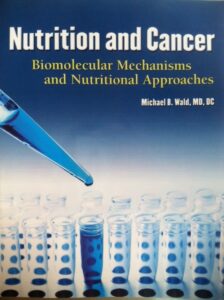Can cancer and chronic disease be cured using a nutritional approach?
Food, exercise, and herbal supplement
-
Can cancer and chronic disease be cured using a nutritional approach? A combination of traditional cancer therapies and nutrition offers the best overall approach.
-
Is chemotherapy radiation always bad for the body in a person with cancer? No. Although chemo and radiation have the potential of causing cancer, the risk of cancer is usually outweighed by the potential for either cure from chemo and radiation.
-
Should foods and nutritional supplements be taken by those who receive radiation chemotherapy? When appropriate based upon the nutrients and the particular needs of the cancer chemotherapy.
If you or a friend or loved one has cancer help them find the nutritional support that they need
Cancer is no joke – and neither is the dietary and nutritional approaches that you choose to get healthy. Depending upon the type and stage of cancer nutritional needs vary greatly. The right foods and nutritional supplements for one person with a cancer diagnosis could be very different than another person’s nutritional needs. Here is what you need to think about when searching for a specialist who provides nutrition for cancer care…
- Nutritional deficiencies, insufficiencies (normal, but not optimal) and increased needs must all be considered when deciding upon nutritional supports for cancer.
- Some cancers increase nutritional needs.
- Different cancers result in malabsorption or malnutrition – and malnutrition can result in reduced immunity, increased risk of infection and poor outcome.
- Certain types of chemotherapy are toxic to healthy cells and nutritional supports may help protect healthy cells – in individuals who are receiving and not receiving chemotherapy.
- How much of each nutritional supplement one takes with cancer varies depending upon body weight, metabolism, genetics, diet, stress, sleep quality and type(s) of chemotherapy or radiation.
- Certain types of chemotherapy work well with certain foods and nutritional supplements and others do not work well together.
- Antioxidants can be used with certain forms of chemotherapy and radiation if used correctly. Some well-meaning oncologists mistakenly assume that their patients should not take antioxidants thinking that they might interfere with “oxidant-acting” chemotherapy. On the surface this reasoning makes sense because if one chooses oxidant-acting chemotherapy then oxidation is the healing method…and taking an ANTI-oxidant would do the opposite (or interfere) with the chemo. The problem with this thinking is that it has been proven largely inaccurate. One major example relates to the anti-oxidant vitamin C. The term anti-oxidant is a misnomer, meaning that vitamin C (and other so-called antioxidants) are not actually antioxidants – they are POTENTIAL anti-oxidants or POTENTIAL oxidants depending upon the person that you provide them to. This is a complex concept, but the bottom line is that it is Dr. Wald’s believe, based upon his extensive research of the medical and nutrition literature, that the majority of so-called antioxidants reduce risk of infection in cancer patients, improve outcome, reduce side effects of radiation and chemotherapy and improve immunity – among other potential benefits.
Nutritional Cancer Care – The Blood Detective Way!

Dr. Michael Wald is the a uthor of, Nutrition and Cancer – a professional level textbook for physicians. Dr. Wald provides personalized nutrition in the form of dietary and focused nutritional supplement suggestions based upon the individualized needs of cancer patients based upon:
Dr. Wald’s comprehensive natural approach to cancer
– Specific cancer diagnosis and current state of health
– Entirety of one’s health and medical history
– Dr. Wald develops comprehensive nutritional plans for all forms of cancer as very few oncologists have the qualifications and thus training to properly manage the serious nutritional needs of those with a cancer diagnosis. No two cancer patients are alike even with the same exact cancer diagnosis and state.
Listen to Dr. Wald’s Show on Cancer : Cancer and The Ten most common misunderstood conditions of all time!
Look at what the Nutritional Cancer Institute says about Nutrition
The diet is an important part of cancer treatment. Eating the right kinds of foods before, during, and after treatment can help the patient feel better and stay stronger. Malnutrition (lack of key nutrients) can result in the patient’s feeling weak, tired, and unable to resist infections or withstand cancer therapies.
· Nutrition therapy can help cancer patients get the nutrients needed to maintain body weight and strength, prevent body tissue from breaking down, help to rebuild tissue, and fight infection.
· Dietary guidelines for cancer patients can be very different from the usual suggestions for healthful eating.
· Nutrition recommendations for cancer patients are designed to help the patient cope with the effects of the cancer and its treatments.
· People who eat well during cancer treatment may even be able to handle higher doses of certain treatments. Being well nourished has been linked to a better prognosis (chance of recovery).
Nutrition is not a replacement for the standard of medical care such as chemotherapy, radiation and/or surgery (other other medical modalities). Some uses of nutrition may be considered Investigational or Experimental as defined below:
Disclaimer: Investigational” or “Experimental
“Investigational” or “experimental” refers to the use of a service, procedure or supply that is not recognized by your insurance company and/or the FDA (Food and Drug Administration) and/or the AMA (American Medical Association) or other appropriate boards and/or governing bodies or organizations (all of the aforementioned considered as “PLAN”), as standard medical care for the condition, disease, illness or injury being treated. A service, procedure or supply includes, but is not limited to the diagnostic service, treatment, facility, equipment, drug or device. A service is considered investigational (experimental) if any of the following criteria are met:
1. The services, procedures or supplies requiring Federal or other Governmental body approval, such as drugs and devices, do not have unrestricted market approval from the Food and Drug Administration (FDA) or final approval from any other governmental regulatory body for use in treatment of a specified condition. Any approval that is granted as an interim step in the regulatory process is not a substitute for final or unrestricted market approval.
2. There is insufficient or inconclusive medical and scientific evidence to permit the Plan to evaluate the therapeutic value of the service, procedure or supply. (Adequate evidence is defined as at least two documents of medical and scientific evidence that indicate that the proposed treatment is likely to be beneficial to the member.)
3. There is inconclusive medical and scientific evidence in peer-reviewed medical literature that the service, procedure or supply has a beneficial effect on health outcomes.
4. The service, procedure or supply under consideration is not as beneficial as any established alternatives and is not a replacement for the standard of medical care for your health condition(s).
5. There is insufficient information or inconclusive scientific evidence that, when used in a non-investigational setting, the service, procedure or supply has a beneficial effect on health outcomes or is as beneficial as any established alternatives.
If any portion of this notice is deemed unenforceable the remainder will remain potentially enforceable and in effect.
 Previous Post
Previous Post